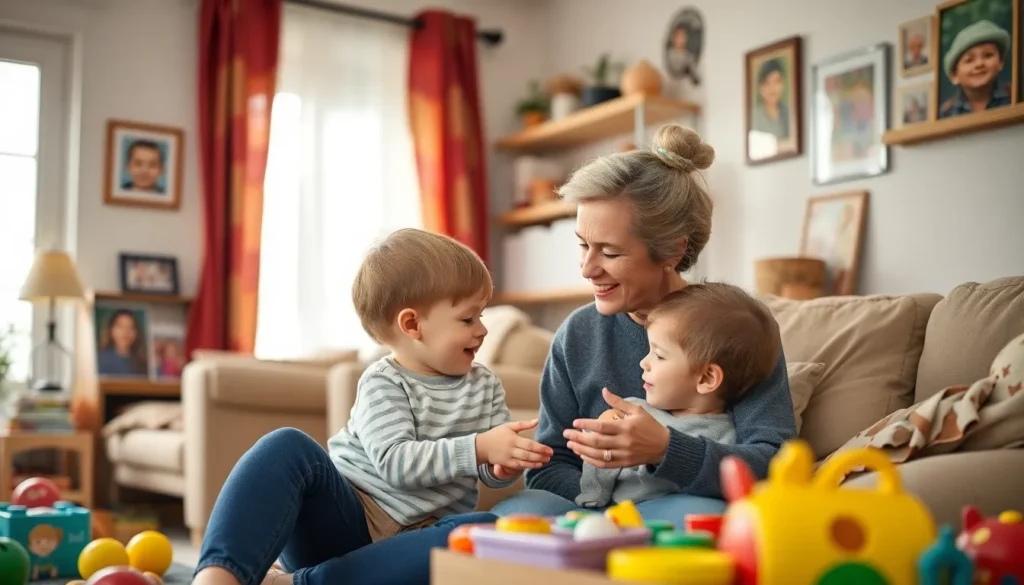In the whirlwind of parenting, patience often feels like a rare commodity. Juggling daily challenges while nurturing young minds can test even the most composed individuals. Yet, cultivating patience is essential for fostering a supportive environment where children can thrive.
Understanding the importance of patience in parenting not only enhances the parent-child relationship but also promotes emotional growth in children. When parents model patience, they equip their kids with valuable life skills, teaching them to navigate their own frustrations and challenges. Embracing this approach can transform chaotic moments into opportunities for connection and learning.
Table of Contents
ToggleUnderstanding Parenting With Patience
Patience is vital in parenting, influencing interactions and overall family dynamics. It fosters a supportive atmosphere, crucial for child development while helping parents manage daily challenges.
The Importance of Patience in Parenting
Patience enhances communication, allowing parents to respond thoughtfully rather than react impulsively. This approach models emotional regulation, teaching children how to manage their feelings. Strong relationships flourish in patient environments, promoting trust and resilience. For instance, when parents practice patience during conflicts, they demonstrate problem-solving skills, leading to better outcomes. Research shows that children learn significantly from observing their parent’s behaviors, making patience an essential parenting skill.
Common Challenges That Test Patience
Parents face various challenges that can strain their patience, including:
- Disruptive Behavior: Children often test limits through tantrums or resistance to requests. Staying calm in these moments proves essential for guiding proper behavior.
- Time Constraints: Busy schedules can lead to frustration, especially during routines like mealtime or bedtime. Prioritizing patience helps maintain a peaceful atmosphere.
- Different Developmental Stages: Each stage of growth brings unique challenges, such as potty training or navigating teenage independence. Understanding these phases promotes patience and support.
- Sibling Rivalry: Conflicts between siblings may arise frequently. Approaching these situations with patience cultivates a collaborative spirit and conflict resolution skills.
- Personal Stress: External stressors can affect patience levels. Self-care practices enable parents to recharge, maintain composure, and respond effectively to their children.
Recognizing these challenges allows parents to prepare and respond with the patience needed to nurture healthy relationships.
Techniques for Cultivating Patience


Patience can be cultivated through various techniques. Implementing mindfulness and effective communication can significantly enhance a parent’s ability to remain calm and present during challenging moments.
Mindfulness Practices for Parents
Mindfulness promotes awareness and presence, benefiting parents in stressful situations. Practicing deep breathing techniques helps calm the mind and body, making it easier to respond rather than react. Engaging in short meditation sessions, even five minutes daily, can foster emotional resilience. Moreover, incorporating mindful observations encourages parents to recognize their emotional triggers, allowing them to approach parenting situations with increased patience. Mindful activities, such as yoga or nature walks, also provide parents a chance to recharge, emphasizing self-care and emotional well-being.
Effective Communication Strategies
Effective communication strategies strengthen the parent-child relationship while reducing conflicts. Using “I” statements, such as “I feel frustrated when,” promotes openness without assigning blame. Maintaining a calm tone and choosing words carefully allows parents to express themselves clearly, reducing misunderstandings. Practicing active listening shows children that their feelings are valid, which fosters trust. Setting aside regular time for conversations encourages open dialogue, enabling parents to address concerns proactively. Lastly, offering praise and positive reinforcement builds a cooperative environment and encourages patience during challenging discussions.
The Benefits of Patience in Parenting
Patience plays a vital role in parenting, offering numerous benefits that positively impact both parents and children. Understanding these benefits can motivate parents to cultivate this essential trait.
Emotional Development of Children
Patience significantly contributes to the emotional development of children. It allows them to process their feelings and learn to manage frustrations. By responding patiently, parents teach children how to cope with setbacks and develop emotional resilience. Children exposed to patient parenting are more likely to exhibit empathy, self-control, and problem-solving abilities, essential skills for navigating social situations and personal challenges.
Strengthening Parent-Child Relationships
Patience strengthens parent-child relationships by fostering trust and open communication. When parents model patience, they create an environment where children feel safe to share thoughts and feelings. This openness encourages deeper connections and mutual respect. Parents who practice patience often find that they can resolve conflicts more effectively, leading to healthier interactions. Consequently, these relationships become a foundation for lifelong emotional support and understanding.
Real-Life Examples of Patience in Action
Patience manifests in various parenting scenarios, showcasing its impact on family dynamics and emotional development. Here are compelling stories and lessons learned from experienced parents.
Stories from Experienced Parents
- Sibling Disagreements: A mother shared her experience with her two children arguing over toys. Instead of intervening immediately, she allowed them time to express their feelings. This approach led to them negotiating a solution, enhancing their conflict resolution skills and strengthening their bond.
- Potty Training: A father recounted his challenges with potty training his toddler. Rather than showing frustration, he celebrated small victories and provided encouragement. This patience helped his child feel supported and more willing to embrace the process, resulting in successful training within a week.
- Homework Assistance: One parent emphasized the struggle of assisting a struggling child with homework. Instead of rushing through assignments, they chose to break tasks into smaller, manageable parts. This method not only alleviated tension but also fostered a sense of accomplishment in the child when each part was completed.
Lessons Learned
- Emotional Regulation: Parents noted that practicing patience allowed them to remain calm during their children’s emotional outbursts. This regulation not only set an example but also created a safe space for children to express their emotions.
- Building Trust: Many parents observed that demonstrating patience nurtured trust within the parent-child relationship. Children felt more comfortable sharing their feelings and concerns, knowing their parents would listen without judgment.
- Encouraging Independence: Experienced parents realized that patience encourages children to become more independent problem solvers. Allowing children to navigate challenges at their own pace facilitated skill development and boosted their confidence.
- Long-Term Benefits: Parents found that the skills cultivated through patient interactions often led to lasting benefits, such as improved empathy, self-control, and communication skills in their children. Being patient in the moment contributes to their children’s overall emotional and social development.




